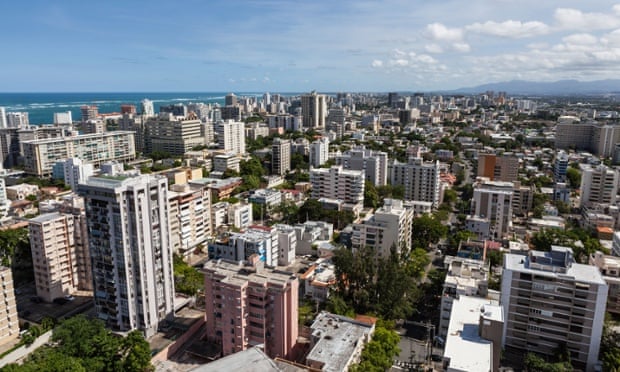Today, April 30th 1:25pm
· Richard Luscombe in Miami
·
puerto rico
world news
us news
jeb bush
republicans
us elections 2016
marco rubio
us politics
For a small Caribbean island barely half the size of Connecticut, Puerto Rico seems to be assuming outsized importance in the race for the White House.
A flying visit this week from the former Florida governor Jeb Bush – who appears ever closer to announcing his intention to seek the Republican presidential nomination – placed the US territory and its electorate of 2.4 million at the heart of his push to win back Hispanic voters.
Bush, who speaks Spanish fluently and who has a Mexican wife, told supporters at public appearances in San Juan and Bayamón about the party’s need to reconnect with the Latino vote.
“We haven’t campaigned in [Hispanic] communities to show respect and to listen,” he said at San Juan’s Universidad Metropolitana on Tuesday. “This is just human nature. If you show respect for people and you have a message that gives them some hope that life can be better, they’re more open to voting for you.”
In comments also presumably aimed to attract the attention of the 640,000 Puerto Rican voters in Florida – who overwhelmingly supported Barack Obama at the last two presidential elections – Bush also sought to soften the Republicans’ traditionally hardline approach to immigration.
“The conservative cause would be better to embrace this rather than push it away,” he said.
“We should create an immigration system that drives economic opportunity for all of us. We should move toward protecting the rule of law, protecting our border [and] making legal immigration easier than illegal immigration.”
Puerto Rico has long been a popular campaign stop for White House contenders, despite having no representation in the electoral college that ultimately determines the president and vice-president following the nationwide vote.
Its importance lies in the delegates it sends to each party’s nominating convention. So keen are candidates to secure them that even the usually unflappable Mitt Romney was caught dancing awkwardly at a street carnival-style rally in San Juan on his way to picking up the delegates that eventually won him the Republican 2012 nomination.
Bush is also no stranger to the high life in Puerto Rico, having spent three months with his wife there in 1979, helping his father George HW Bush win the presidential primary and, as he admitted on Tuesday, learning “how to drink a lot of Puerto Rican rum”.
His approach this week is somewhat more sober. During his appearances, the second at a town hall-style meeting in Bayamón, he placed himself into the decades-old debate still raging on the island over its future direction, specifically whether Puerto Rico should ever become the 51st state of the union. In a 2012 referendum, more than 61% of islanders declared themselves in support of statehood.
“Puerto Rican citizens ought to have the right to determine whether they want to be a state,” he said. “I think statehood is the best path, personally. To get the full benefits and responsibilities of citizenship, being a state is the only way to make that happen.”
These are troubled times in Puerto Rico. Mired in a $73bn public debt crisis and with finance chiefs warning last week of an imminent government shutdown, the statehood debate has taken on new significance.
“The root cause of these enduring problems is our political status,” said Pedro Pierluisi, Puerto Rico’s resident commissioner to Congress, in a letter this week to the New Yorker.

“Each year Puerto Rico loses out on billions of dollars in federal spending and tax credits that Congress sends to the states. To compensate for the shortfall in federal funding, Puerto Rico’s government has borrowed heavily in the bond market, leading to the excessive debt. To overcome its economic challenges, Puerto Rico must become a state.”
Pierluisi has introduced two bills to Congress, one that would require a formal vote on statehood by July 2019, and another, currently at committee stage, that would amend the federal bankruptcy code to allow Puerto Rico to be treated as a state. This would provide the island with protection from creditors under Chapter Nine of the code, similar to that enjoyed by the city of Detroit during its 2013 financial crisis.
Another measure that Puerto Rico’s governor, Alejandro García Padilla, had proposed to help ease the crisis, a new value added tax of 16%, was rejected by the island’s legislature this week as well as a 13% levy on goods and services. In a statement on Thursday, García Padilla warned of negative consequences from the politicians’ rebuff and said: “The island’s future is at risk because of them.”
For Bush, meanwhile, there are no guarantees of islanders’ support in the March 2016 primary, despite his stirring words this week on the issues of statehood and immigration. He will face stiff competition from the Florida senatorMarco Rubio, the son of Cuban immigrant parents and one-time supporter of immigration reform, who announced his run for the Republican nomination earlier this month.
No comments:
Post a Comment